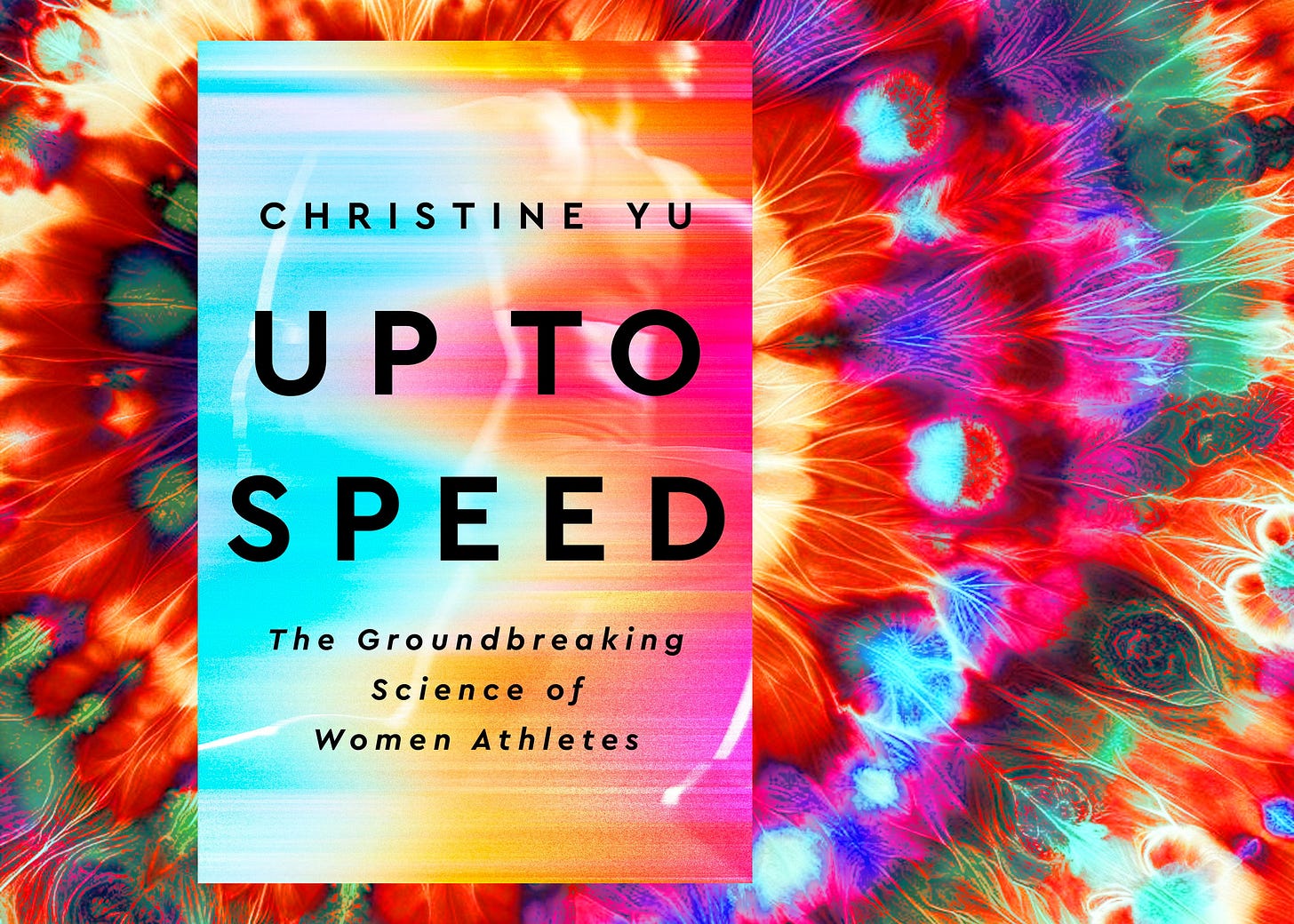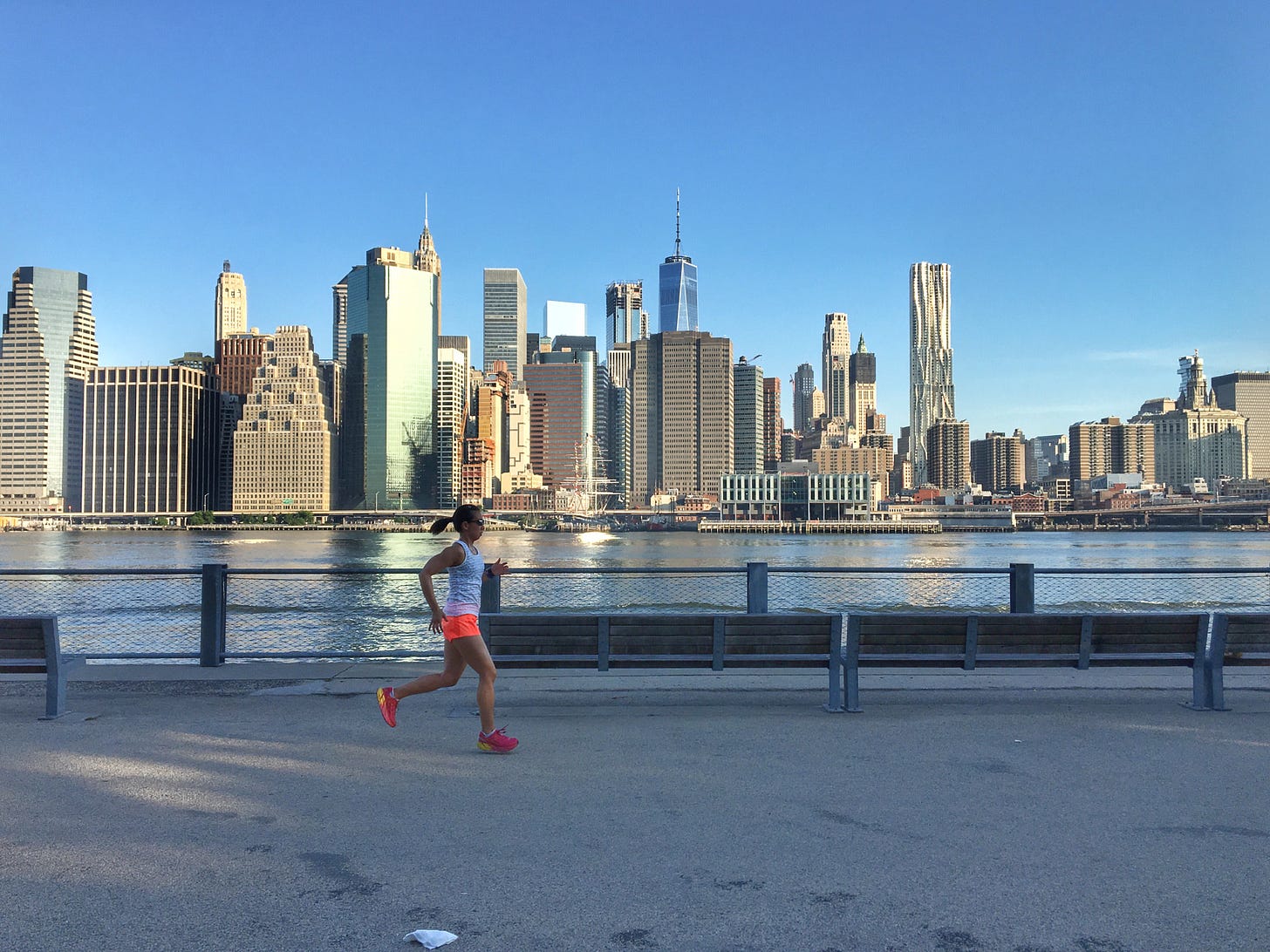What women want…
It’s perplexed men for eternity. Some would say the answers have always been right there. I spoke to Christine Yu, journalist and author of 2023’s Up To Speed about why the answers still aren't clear.
Over the past year, I’ve received a few negative comments, but the one that sticks with me the most is a man who asked why I write about women so much. I didn’t answer him, but it did make me think.
From a personal perspective, I enjoy writing about things that might help me understand the world better. I try to speak to and write about people who experience life differently to me, whether they’re running thousands of miles or suffering miscarriages and mastectomies. From a pure data perspective, less than a quarter of my articles were focused on women.
He actually made me think that I wanted and maybe needed to read and write about women more. What an idiot.
When I started this newsletter last March,
was one of the first cohort of other runner/writers I happened upon. The first post of Christine’s that I read was about her myriad injuries but it ended with a bright little banner ad for her forthcoming book, Up to Speed: The Groundbreaking Science of Women Athletes.The title alone intrigued me. I couldn’t wait to get my paws on it.
The book
11 months since publication, and it’s got 4.3/5 on Goodreads and 4.6/5 on Amazon. I ended up reading it last autumn with my local run club’s book club. I was shocked at how much this book changed my stance from casually militant feminist to pure, active outrage. How do I do it justice in a review?
Up To Speed is one of the most important books ever published for moving the needle with how female athletes are treated.
Covering topics ranging from hormones, biological sex, and the problems with knees/ACLs, to RED-S and unhealthy focus on diet, Up To Speed is a comprehensive, information-dense review of the current status quo of women’s sports performance. If it feels like a constant comparison to the freedoms men are afforded, maybe it needs to.
Using a heady mix of hard scientific data and anecdotal experiences about the environment and society we live in, Christine shines a light on the things we need to do and the way we need to think in order to improve women’s sports, but also on the things we have historically learned that we need to forget. As we strive for equality in sports (and in the world), this is an essential read for those in decision-making positions.
What led you to writing Up To Speed?
“Through my reporting, I kept touching on these buckets of topics, but they all felt very siloed. It felt like there wasn't anything that pulled this stuff together under one umbrella and looked at it holistically. I was interested in what the science says, what we know about all of this, and - most importantly - what we don’t know.”
What were your expectations while writing the book?
“I was most concerned with getting the science right. My biggest fear was that some of this information might be misconstrued in some ways.”
“My expectation was it was just going to be a solid overview of what's happened on the scientific front with some sports history sprinkled in there. As it's come out, what's surprised me is how resonant it's been for people across the spectrum.”
“The other piece is how much it exposes those blind spots in our infrastructure and systems that are in place, and I kind of knew that going in but I didn't really think that that would be the main focus of the book.”
Was there a moment where you realized you needed to write Up To Speed?
“I was talking to a researcher about concussions. For so long, I had heard women have worse concussion outcomes than men. It was almost a given. That's just the way it is, right?”
“What she was telling me was that - especially for younger athletes - if boys and girls saw a specialist within the same time frame, those disparities went away. She told me if there were actual biological or physiological sex differences, it shouldn't matter when someone sees a specialist. Those disparities should remain.”
“That made me think about expanding what gender differences mean, and look at the bigger picture and what is actually influencing what's going on. Some of those things that we might think of as fixed differences might not actually be fixed.”
Christine is talking about societal factors. Things that are down to human behavior, rather than anything biological. Institutional bias, for instance.
Maybe this is the incredibly woke social media feeds that I’ve curated for myself, but I see women joking (it is dark humor rooted in anger) about doctors ignoring their pain until they are hospitalized, and even then just sending them home with a couple of ibuprofen. I see decades-long misdiagnoses for chronic illnesses like endometriosis - something the male-dominated medical space is just learning about enough to help patients with.
It tracks that women are treated less well when it comes to sports. It tracks that there is markedly less research on women when it comes to sports. It tracks that this book was… is painfully necessary.
Christine on running
Christine Yu only started running because it was part of her school PE program, and her origin story is one that mirrors mine.
“My parents immigrated from Hong Kong and coming from that background, the expectations were you would do well in school. Sports weren’t really in the picture. Had [running] not been required, I don't know if I necessarily would have had the opportunity to be exposed to it in the way that I have.”
Continuing to run through college, Christine reached the point where she started to enjoy the action itself, and could develop her practice beyond mere exercise and calorie-burning. Motherhood also added a new dimension to running.
“After I had kids, it was the time I could escape the house and it was no crying babies and nobody asking me for something, but it’s that time for myself that has become important for me.”
At a writing and running retreat, she learned a new method of “setting conditions of satisfaction” - something that is still goal-oriented but doesn’t involve numbers quite so much. A qualitative approach.
“It used to be I would only be satisfied if I ran a certain pace or a certain number of miles, but knowing that that's not always going to happen, what are the conditions of satisfaction for me that would make me feel good about this run?”
“It’s been helpful in terms of recalibrating how I approach it and allows me to be a little bit kinder. It can be anything from running for an hour or actually doing my drills during my workout. It's something that is achievable, that also will make me feel like I've met my conditions.”
I’ve written about finding happiness during this leisure pursuit that we like to do - and it’s important, I think, to remember that running is something we’re doing during our leisure time. It’s not work. It’s not medicine. It’s a hobby. For me, finding happiness though it can certainly revolve around achieving goals, and Christine’s method is certainly less harsh and more fun, perhaps, even if it does include those pesky drills sometimes.
A big part of that is comparison. It’s the thief of joy, as they say, and even if the only person you’re comparing yourself to is yourself, there’s usually a faster version of yourself to compare yourself to. It’s a problem!
“The hardest part of my runs these days is not comparing myself to my younger self or how I used to run. It's hard! I don't run with a watch now. It's taking away those things, because I do tend to focus on the data and progress. It’s practising a bit of gratitude. When I come back, I try to think of three things that went well.”
The future of women’s sports
I said that Up To Speed is a crucial text in progressing the sport for women, but what are the next steps? How does the future look right now? What do we need to do? Is anyone listening? (They are.)
“I think we're starting to see some of the changes. especially amongst younger athletes. Those at the collegiate level are demanding a better system of coaching that does support them as full human beings. Not just their performance, but also their lived context, their physical and mental health. Then they perform better.”
“We do need more research. We need a better infrastructure that supports the coaches, the sports science staff, and whoever else is working, so that they can help people prevent injury and perform better. All of these things that we need to keep folks healthy, rather than just guessing and making assumptions.”
“We need that scientific research to prop up that infrastructure, so that we can move forward.”
As a society, we’ve got work to do! Where does that start? For many, it’s reading conversations like these.
When I’m interviewing women about the nebulous idea of ‘women’s things,’ I somewhat apologetically mutter to them that it’s all stuff that I don’t know and can never truly know. Simply because I’m a man! I’m grateful to be able to speak to people like Christine Yu and find out these perspectives first-hand. All I can do is lift up voices like hers, doing and saying things I’m unable to.
Hopefully, I’ve pointed towards some of the incredible stuff in Up To Speed without ripping it off word-for-word. Enough for you to go and read the book, anyway.
Ways to make running suck less covered today
Run to get some precious time for yourself
Set gentler conditions of satisfaction
Do your drills!
Remember that you run for fun
Try not to compare your running to anything - even yourself
Use science to build positive infrastructure for female athletes
Read cool newsletters about running from me and Christine
Running Sucks Haiku of the Week
What do women want?
Tough, when your head’s in the sand.
Guess we’ll never know.
It’s always a funny one writing about slightly ‘social’ issues like this. Some hate that I’m trying. Others believe it’s not my place. Half shrug with indifference. But the rest of you do enjoy thinking about it and maybe even taking the conversation a little further, so that’s nice. That’s the stuff I like to see.
So… what do women want? Tell me in a comment!
Housekeeping
MERCH - Get your Running Sucks stickers! There are three of them, and you get THREE MONTHS of upgraded subscription included for FREE, which is 36 bonus competition entries. It’s a great deal.
WIN - Click here to win a $50 Janji gift card. There were 29 entries last week. Serial entrant Angeline won for the second time. It’s how it works!
$$$ - Upgrade your subscription for $30 OR tip a one-off $3 if you enjoyed reading this. Thanks in advance, you lovely people x
CONNECT - Follow me on Instagram and join the Running Sucks Discord server. My artwork is becoming more unhinged week by week.
Further reading
Christine Yu [WEB] [SUBSTACK]
Up To Speed [Goodreads] [Amazon]
Related articles
This piece on Christine by
rips.











Bravo Raz!! Excellent post and painfully necessary!! I have Christine Yu's book in my stack to read and looking forward to it. We have some work to do! What women want..."Let's roll up our sleeves and lead the way. Keep sharing our stories uplifting others."
Thank you Raz!!
Quality post, Raz. You got my subscription. No coincidence I stumbled upon this — I’m a running coach who works predominantly with women, and agree with you and Christine on everything!